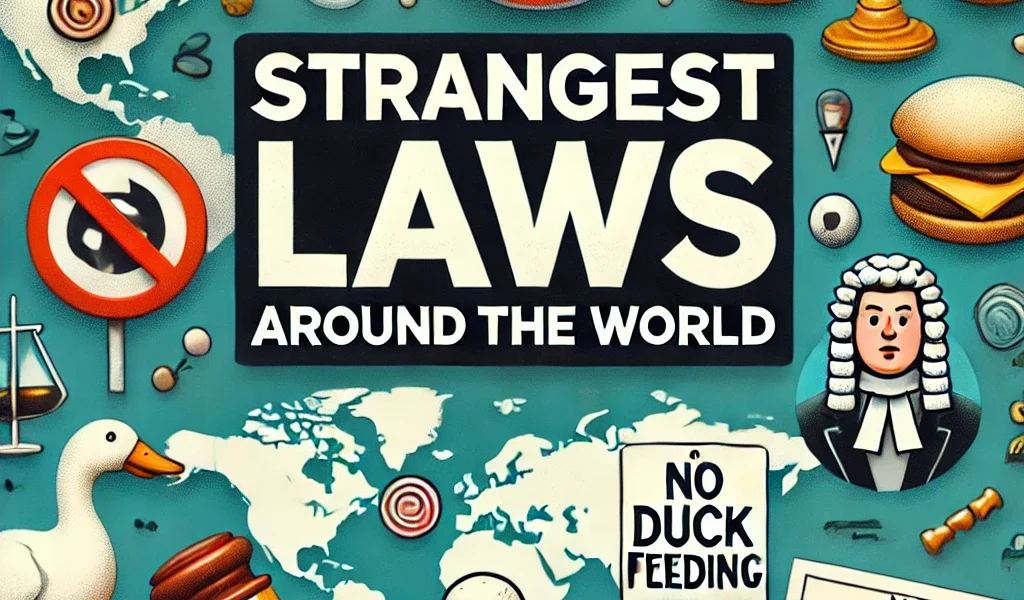Every country has its own set of laws, but some regulations can be quite bizarre and leave you scratching your head. From unusual rules about food to strange restrictions on everyday activities, the world is filled with laws that, while serious to their respective cultures, may seem odd or amusing to outsiders. In this article, we will take you on a global tour to explore some of the strangest laws from around the world, revealing the reasons behind these quirky regulations.

1. No Chewing Gum in Singapore
Singapore is known for its strict rules when it comes to cleanliness, and the ban on chewing gum is one of the most famous. Introduced in 1992, the ban was implemented to prevent the sticky remnants of gum from damaging the city’s public transportation and streets. Importing gum without a valid medical reason is illegal, and the sale of gum is restricted to pharmacies.
Why It Exists:
The law was enforced to reduce litter and maintain the pristine condition of Singapore’s public areas.
2. You Can’t Wear High Heels at Ancient Sites in Greece
Visiting ancient ruins in Greece? Leave your high heels at home. The Greek government has banned high heels at historical sites, such as the Acropolis, to protect the ancient marble structures from potential damage caused by sharp heels.
Why It Exists:
The fragile nature of ancient Greek monuments requires careful preservation. High heels could cause micro-damage to these historical treasures.
3. It’s Illegal to Feed Pigeons in Venice, Italy
Venice is famous for its canals and beautiful squares, but feeding pigeons in Piazza San Marco is a big no-no. Since 2008, feeding pigeons in public places has been banned to prevent damage to Venice’s architectural wonders and reduce the health risks posed by large flocks of birds.
Why It Exists:
Pigeons were causing significant damage to the historic buildings by pecking at stonework and leaving behind corrosive droppings.
4. No Ice Cream Cones in Pockets in Kentucky, USA
One of the strangest laws in the United States can be found in Kentucky, where it’s illegal to carry ice cream cones in your pocket. Although the origins of this law are debated, some say it was enacted to prevent people from stealing horses by luring them with ice cream.
Why It Exists:
Though rarely enforced today, the law was allegedly designed to prevent horse theft in the 1800s.
5. Don’t Run Out of Gas on the Autobahn in Germany
The Autobahn is famous for its stretches without speed limits, but Germany has a strict rule regarding running out of gas. Drivers who run out of fuel while speeding on the Autobahn can face fines. The reasoning is that running out of gas is considered preventable and can cause dangerous accidents.
Why It Exists:
Stopping unnecessarily on the Autobahn, especially due to running out of gas, is viewed as negligence and poses a serious risk to drivers.
6. You Can Only Have Two Children in a Family in China (Former Law)
For decades, China enforced a one-child policy to control population growth. However, this was later relaxed to a two-child policy in 2016 before being scrapped altogether in 2021. While the law is no longer in effect, it shaped the country’s demographic and social policies for a generation.
Why It Existed:
The one-child and two-child policies were introduced to prevent overpopulation and the strain on resources.
7. Don’t Hike Naked in Switzerland
If you’re planning a hiking trip in Switzerland, keep your clothes on! It’s illegal to hike in the nude after several incidents where tourists hiked through the countryside without proper attire, much to the dismay of the locals. Swiss authorities now impose fines on those who are caught.
Why It Exists:
Public nudity is considered offensive in Switzerland, and the law aims to preserve public decency, especially in family-friendly hiking areas.
8. No Reincarnation Without Permission in Tibet, China
One of the most unusual laws in the world is found in Tibet, where Buddhist monks are required to obtain government permission before they can reincarnate. This law was introduced by the Chinese government in 2007 as a way to assert control over Tibetan religious practices, particularly the selection of new lamas.
Why It Exists:
The law is politically motivated, intended to maintain state influence over Tibetan Buddhism and religious leadership.
9. No Winnie the Pooh T-Shirts in Poland
In some areas of Poland, you’re not allowed to wear Winnie the Pooh-themed clothing in public playgrounds or schools. The ban is due to concerns about the character’s lack of pants, which is seen as inappropriate for children.
Why It Exists:
Polish authorities deemed Winnie the Pooh’s lack of modesty unsuitable for public settings frequented by children.
10. No Water Pistols on New Year’s Eve in Cambodia
In Cambodia, using water pistols to celebrate New Year’s Eve has been banned. The law was introduced to prevent chaos and traffic accidents caused by reckless water fights, which were once common during the celebrations.
Why It Exists:
The water pistol ban was put in place to avoid public disturbances and ensure safety during the New Year’s festivities.
11. It’s Illegal to Die in Longyearbyen, Norway
In Longyearbyen, a remote town in Norway’s Svalbard archipelago, it’s illegal to die. Since the ground is too frozen to allow bodies to decompose, burials are not permitted. If someone is terminally ill, they are sent to the mainland to live out their final days.
Why It Exists:
The law is based on practical reasons, as permafrost prevents proper burial and can cause health risks from preserved remains.
12. No Dancing in Public in Japan
Until 2015, dancing in public establishments in Japan was illegal after midnight unless the venue had a special license. The law, known as the Fueiho Law, was originally introduced to prevent improper behavior during World War II and remained in place for decades before being lifted.
Why It Existed:
The law was initially enacted to crack down on unsanctioned nightclubs and reduce immoral behavior during the war.
13. No Camouflage Clothing in the Caribbean
In many Caribbean countries, including Barbados, Jamaica, and Saint Lucia, it is illegal for civilians to wear camouflage clothing. This law was enacted to prevent people from impersonating military personnel.
Why It Exists:
The ban on camouflage is intended to maintain the distinction between civilians and military members, ensuring public order and safety.
14. No Ketchup in French Schools
In France, the government has banned ketchup from school cafeterias, except when served with French fries. The law is part of an effort to preserve traditional French cuisine and promote healthier eating habits among schoolchildren.
Why It Exists:
The ban was introduced to maintain French culinary heritage and encourage students to eat balanced meals.
Conclusion: The World’s Strangest Laws and Their Cultural Context
The world is filled with quirky and unusual laws, many of which have deep cultural or historical significance. While these laws may seem strange to outsiders, they reflect the values and priorities of their respective countries. From banning chewing gum in Singapore to prohibiting high heels at ancient Greek sites, these laws highlight the diversity of legal systems around the globe.











